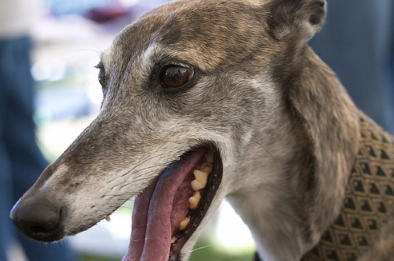Entertainment
In West Virginia, greyhound racing’s days could be numbered

At one of the last remaining greyhound tracks in the U.S., dogs with names such as Terracuda and Flyin Jawbreaker outnumber the people watching in the stands. (Photo: Liza/Flickr)
NITRO, W.Va. — At one of the last remaining greyhound tracks in the U.S., dogs with names such as Terracuda and Flyin Jawbreaker outnumber the people watching in the stands.
The race bettors and spectators at the Mardi Gras Casino and Resort in West Virginia stopped showing up long ago. Soon, the greyhounds could be gone, too.
That’s because the Legislature passed a bill to end $14 million in subsidies that benefit dog racing breeders and handlers at the state’s two racetracks. Lawmakers want that money to address a state budget shortfall expected to reach as much as $500 million next fiscal year.
Racing officials believe that if the governor signs the legislation, it will kill the industry and force hundreds to go elsewhere to find work.
“It’s hard to want to stay in the state when they don’t want you, and that’s how it feels,” said Heather Lomax, a trainer for Cavender Kennels. Her family has been in the dog racing business for four decades.
During dog racing’s heyday, there were about 60 greyhound tracks in the U.S. But the rise in slot machines and table games has led to racing’s decline. Over the last decade, dog tracks were eliminated in Arizona, Colorado, Massachusetts, New Hampshire and Rhode Island.
There are about 20 tracks in six states, including Alabama, Arkansas, Florida, Iowa and Texas. Florida has the most tracks with 12.
Like other states, West Virginia started the subsidies for the racing industry when slot machines and table games arrived. Money for the West Virginia Racing Commission’s Greyhound Breeding Development Fund comes from a portion of those games at the greyhound tracks. The fund in turn provides much of the purse money kennel operators earn when they win or finish well in the races.
A 2015 study found that the dog racing industry’s economic impact barely outgained the subsidies and suggested eliminating them. A track at Wheeling Island, sandwiched in the state’s Northern Panhandle between Ohio and Pennsylvania, has also felt the pinch of competition from new casinos in Pennsylvania.
After years of tinkering, the Legislature finally went along with what other states already viewed as no longer a good bet.
“West Virginia’s future is not in subsidizing losing ventures like these,” Republican Sen. Mike Azinger said during debate last week.
The industry’s last hope rests with Democratic Gov. Jim Justice. It’s not clear if he will sign the measure. He must make a decision by the end of the week.
By the look of the empty stands in Nitro, public interest has waned.
Most patrons were at the table games and video lottery machines on the main level. Downstairs at the track annex, a half dozen people quietly watched the dogs run. A few others huddled near televisions and bet on races elsewhere.
Retiree Nathan Clay was there to celebrate his 73rd birthday with his younger brother and his sister-in-law. They go three to four times a month and don’t expect to get rich.
“I come for entertainment and enjoyment,” Clay said as he placed a $6 wager. “You can’t sit at home all the time.”
Those in the industry say they’ll probably move out of state if the bill becomes law, and they wonder if restaurants, grocery stores and other businesses that benefit from the workers will be forced to close.
Rhea LaCuesta has worked at Steubenville Kennel for seven years. She makes $20,000 a year.
“If it wasn’t for racing, I wouldn’t stay here,” LaCuesta said.





















